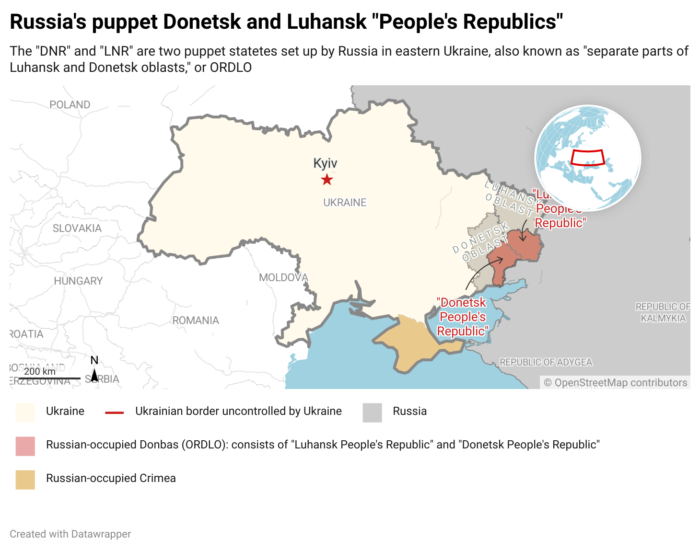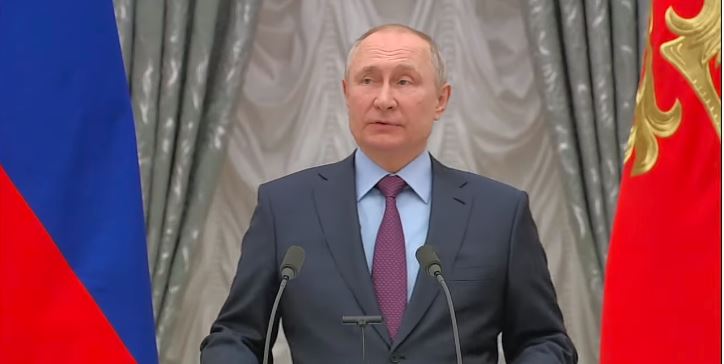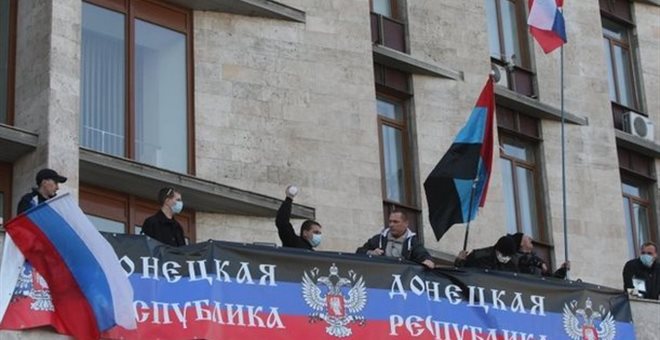After recognizing its puppet Donetsk and Luhansk “republics” in Donbas on 21 February, Vladimir Putin on 22 February stated it is recognizing them within the borders of two entire Ukrainian oblasts, the Luhansk and Donetsk oblasts. He also announced Russia is withdrawing from the Minsk agreements.
Currently, the Luhansk and Donetsk “republics” (“LNR”, “DNR”) occupy roughly 1/3 of the territory of those two oblasts.

The idea was first floated by the self-proclaimed “leadership” of the statelets.
“LNR territory is the former Luhansk Oblast… we need to call on Ukraine to withdraw forces..or a decision to ‘establish peace and restore [militant] sovereignty’ will be made,” “Deputy speaker of the LNR parliament” Khoroshylov was quoted in the morning by RIA Novosti as saying.
The self-proclaimed leader of the “DNR” followed suit. Speaking on air of Rossiya-1, he said the borders of the “republics” will be “within the Donetsk and Luhansk oblasts.”
These statements came ahead of the Russian Duma’s ratification of agreements with the “republics.” Their main points:
- the sides (Russia and the “republics”) agree not to partake in unions directed against the other side;
- issue of double citizenship, recognition of documents, travel were outlined;
- sides give right to build, use, improve and use military structure and bases on their territory;
Essentially, the agreements give Russia the right to full military activity, including building in the territory of the “LDNR,” The agreements themselves do not say what the territory of this “LDNR” is, only specifying that the issue of the protection of the state border to be determined in a separate agreement.
So, the issue of whether Russia will be laying further territorial claims to territory controlled by the Ukrainian government was left floating in the air.
This was cleared up at a press conference of Vladimir Putin in the evening.
Speaking during it, Putin confirmed that Russia has recognized the “LDNR” within the borders of Luhansk and Donetsk oblasts:
“We have recognized all their fundamental documents, including the constitution, and the constitution sets out the borders within the Donetsk and Luhansk oblasts at a time when they were part of Ukraine.”
According to Putin, he understands that this is a “controversial issue”, and he hopes that it will be resolved during talks between Ukraine and the “leadership of the republics.”
He added that this is impossible now because fighting is taking place in Donbas, but he hopes that such talks will take place in the future.
Thus, Putin confirmed that Russian troops, who are already allowed to enter the so-called “LNR” and “DNR,” can take part in offensive operations in the Kyiv-controlled territory of Luhansk and Donetsk oblasts.
This announcement came as earlier in the day, the Russian parliament’s upper house voted to allow President Vladimir Putin to use the Russian army outside the country to support the “LDNR” proxy states in Ukraine.
Putin also confirmed that Russia is unilaterally withdrawing from the Minsk agreements:
“They no longer exist, why implement them if we recognized the ‘republics’,” he said.
The Minsk agreements, two protocols signed in 2014 and 2015, were de-jure intended to resolve the conflict in Donbas, but de-facto were a ticking time bomb to undermine Ukraine’s sovereignty, leaked emails of a Kremlin top-official revealed.
Since 2015, Ukraine and Russia have clashed in interpretations of the protocols. Russia demanded Ukraine enter into direct negotiations with the “leaders” of the republics, which for Ukraine was a “red line,” as it maintained that the “leaders” are puppets of the real mastermind of the conflict in Donbas — Russia.
Another demand of Russia was that Ukraine holds elections in the “republics” and grants them a “special status” within its administrative framework before it regains control over its border. This was another “red line” for Ukraine.
One of the first provisions of the Minsk agreements was a full and comprehensive ceasefire. However, the Russian proxies refused to adhere to it from the first days.
Everything you wanted to know about the Minsk peace deal, but were afraid to ask
At the same conference, Putin laid out demands for the “rehabilitation” of relations with Ukraine — that Ukraine recognizes Russia’s occupation of Crimea and abandons goals of NATO integration.
In addition, Putin said that the main point of his demands was the “demilitarization” of Ukraine. He added that Western partners, in particular NATO members, must stop supplying modern weapons to Ukraine and deprive it of existing military assistance.
Related:
- Leaked Kremlin emails show Minsk protocol designed as path to Ukraine’s capitulation – Euromaidan Press report
- Everything you wanted to know about the Minsk peace deal, but were afraid to ask
- After “hour of imperialism and chauvinism” Putin recognizes his Donbas puppets, sends in troops
- Russia’s hybrid war against Ukraine and the West is entering the next phase: The crisis
- “Threat of democracy.” The real security concerns behind Russia’s lies about NATO








